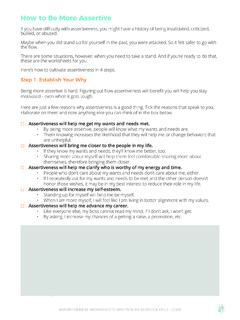Transcription of Understanding Your Mental Wellbeing - The Wellness Society
1 A Brief Introductionto the Science ofMental WellbeingThis guide is uncopyrighted. Please feel free to share it on yourwebsite with an attribution and a link to our MentalWellbeingTHE Wellness SOCIETYCONTENTSP roblems with the Current Approach to Mental Health ..3 Situational Causes of Poor Mental Causes of Poor Mental Wellbeing ..5 Other Causes of Poor Mental Wellbeing ..6Dr Paul Gilbert's Evolutionary Model ..9 Your Personal Signs of Poor Mental Wellbeing ..11 Understanding Panic It's Understandable We Struggle to Cope ..13 Parenting Styles Associated with Poor Mental Wellbeing ..13 How Poor Parenting Affects Your Relationships ..15 The Subordinate Approval Trap.
2 16 Improving Your Mental Wellbeing by Hijacking Vicious 18 PAGE 3 THE Wellness SOCIETYPROBLEMS WITH THE CURRENT APPROACH TO Mental HEALTHC ommon Mental health problems outlined in the Diagnostic and Statistical Manual of Mental Disorders (DSM) and International Classification of Diseases (ICD) include: Depression Generalised anxiety disorder Social anxiety disorder Panic disorder Phobias Post-traumatic stress disorder (PTSD)This language of disorders the medical/disease model has been heavily criticised for a long time. Deeply flawed and scientifically unsound. Professor Allen Frances, the Chair ofthe DSM-4 committee Totally wrong, an absolute scientific nightmare.
3 - Dr Steven Hyman, formerNational Institute of Mental Health (NIMH) director It undermines genuine empathy and compassion; instead of seeing the people s difficulties as understandable and natural responses to terrible things that have happened to them, the person is seen as having something wrong with them an illness . Professor Peter Kinderman, former Vice-President of the BritishPsychological Society (BPS)The NHS website also outlines two main criticisms of the current diagnostic approach:1. An increasing tendency to "medicalise" patterns of behaviour and mood that are not considered to be particularly An unhealthy influence of the pharmaceutical industry on the revision British Psychological Society (BPS) has long called for a system overhaul in relation to Mental health.
4 They highlight several problems with the current system such as limitations in validity ( , inaccurate diagnoses) and reliability ( , inconsistent diagnoses), as well as noting the negative impact diagnoses can have on people s identity. We believe that the majority of Mental health problems are best understood as normal human responses to distressing situations and the culture we live responses to distress with limited Mental Wellbeing health is best understood as a spectrum that we all move along in our YOUR Mental WELLBEINGPAGE 4 THE Wellness SOCIETYV iewing Mental health as a spectrum helps to communicate that: There are no clear logical boundaries of what is an unhealthy level of Mental distress that should qualify as a Mental disorder.
5 The majority of Mental distress is primarily due to non-biological causes such as distressing situations and damaging social systems. Whilst either anxiety or depression symptoms can be more prominent, they clearly aren t separate mixed anxiety and depression is the most common the past few years, the National Institute of Mental Health (NIHM) has stopped funding studies that present depression and anxiety as different diagnoses. A spectrum-based framework called Research Domain Criteria (RDoC) is now being developed. "Psychiatric labels refer to human conditions that cannot be pigeonholed, because they are not diseases, but subjective human experiences that exist along a complex continuum.
6 " - Peter BregginIt s important to understand that poor Mental health is associated with real physical changes that happen due to our in-built evolutionary responses to distressing situations, which we ll discuss Dive For more information, watch the talk 'Trauma and Mental Health' by clinical psychologist Dr Lucy Johnstone. As Johnstone states, "People have the right to know that there are serious concerns about the scientific validity of these labels."SITUATIONAL CAUSES OF POOR Mental WELLBEING1. Childhood Trauma It is politically convenient for policy makers to emphasize individual biology in ways that decontextualize Mental health problems and thus deflect scrutiny from damaging social systems.
7 Childhood abuse and neglect, adulthood assault, poverty, and discrimination have devastating personal consequences, yet medicalizing subsequent distress permits a level of denial and distancing that absolves those in power of responsibility for addressing injustice and instituting legislative change. Eleanor Longden et shows that experiencing childhood trauma is disturbingly Adverse Childhood Experiences Study (ACE Study) is one of the largest scale investigations into childhood trauma and later-life health and whopping two thirds of the participants had an ACE score of at least one 11,078 out of17,337 people had experienced some form of abuse or parental participants were mostly white, middle and upper-middle class, and college-educated.
8 They had good jobs and great health shows that as the number of ACEs increases, so does the risk for negative Mental and physical health outcomes. You can find out your ACE score here. ?PAGE 5 THE Wellness SOCIETYR ecommended ReadRead our free eBook Understanding and Healing Trauma (The Fluff-Free Guide)(available on Amazon) to learn more about the impact of childhood traumaand how to heal it. 2. Loss and Entrapment Situations Feeling lonely and disconnected from others, Feeling trapped in a relationship you no longer want to be in, Feeling trapped in a job you don t want to be in anymore, An unwanted period of unemployment, Divorce or relationship breakup, Personal illness, Threat Situations Lacking a sense of security and/or control in terms of employment, finances, and housing, Work-related stress, which has been shown to be related to six core areas:1.
9 Demands issues with your workload, work patterns and work environment2. Control lacking control over the way you do your work, the pace of your work, and when you take breaks3. Support lacking sufficient encouragement and resources at work4. Relationships experiencing conflict and unacceptable behaviour 5. Role a lack of clarity around your role and responsibilities6. Change - problems with effectively communicating organisational change and a lack of consultation between employees 4. Change Situations Changing jobs, Moving house, Pregnancy and becoming a parent, Getting married, Being a carer for a family member or friend that requires a lot of CAUSES OF POOR Mental Wellbeing The lack of compulsory Mental Wellbeing skills education in schools, Rising levels of work-related stress, Excessive funding cuts to local authorities and Mental health services, The loneliness epidemic, Damaging neoliberal values in Western societies ( individualism, competitiveness, overwork and materialism), Helicopter parenting and the impact of neoliberal values on parenting styles ( parents placing higher demands on their children)
10 , The harmful effects of social media and excessive mobile/tablet usage ( perfectionism, blue-light exposure, and body image issues), Toxic masculinity ( the pressure that exists on men to suppress their emotions and thus not reach out for support), The harmful effects of non-constructive and sensationalist journalism ( news that revolves Understanding YOUR Mental WELLBEINGPAGE 6 THE Wellness Society around negative and conflict-based stories), High levels of income inequality, The crisis of inadequate, unaffordable and insecure housing, The fact that a fifth of the UK population is now living in poverty, amid the worst decline for children and pensioners in CAUSES OF POOR Mental Wellbeing Problems with the thyroid gland, Vitamin deficiency ( , B12)



